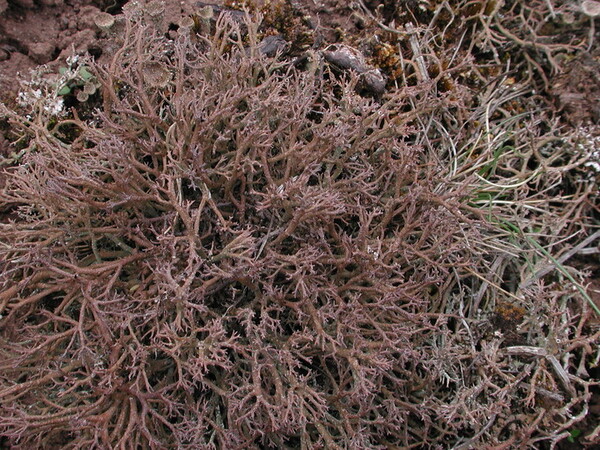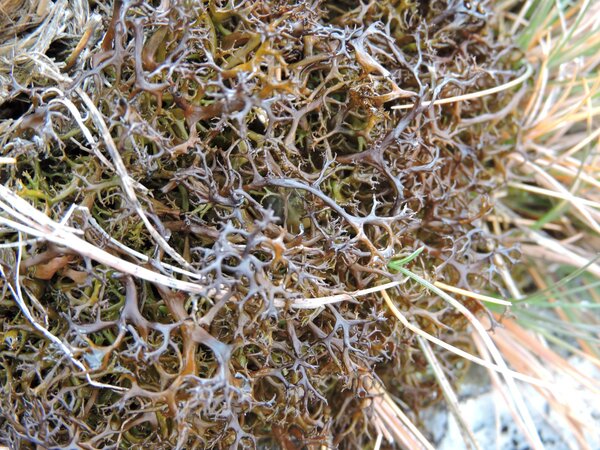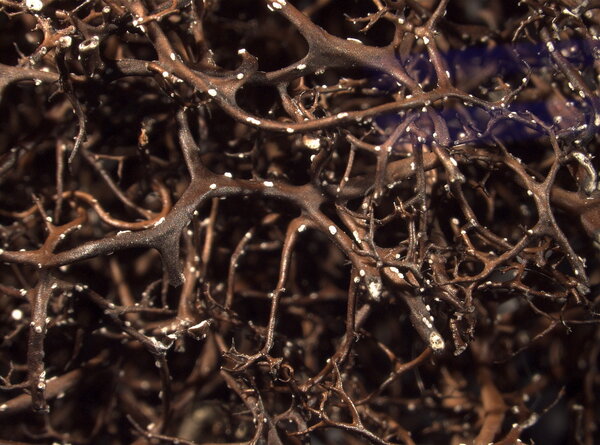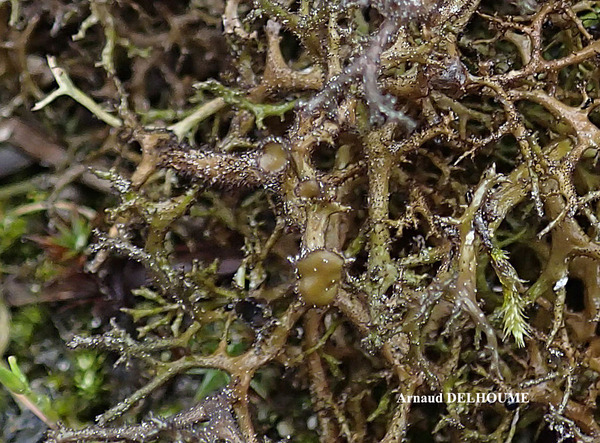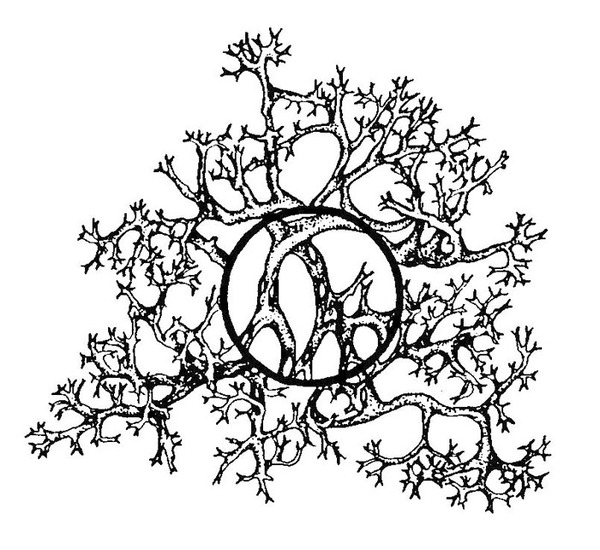Cetraria aculeata (Schreb.) Fr.
Syst. Orb. Veget.: 239, 1825. Basionym: Lichen aculeatus Schreb. - Spicil. Fl. Lips.: 125, 1771.
Synonyms: Cetraria aculeata var. campestris Schaer.; Cetraria aculeata var. edentula (Ach.) Nyl.; Cetraria aculeata var. sorediata Du Rietz; Cetraria aculeata var. spadicea (Roth) Ach. ex Mong.; Cetraria bohemica Anders; Cetraria tenuissima (L.) Vain.; Cetraria tenuissima var. campestris (Schaer.) Erichsen; Coelocaulon aculeatum (Schreb.) Link; Coelocaulon bohemicum (Anders) Clauzade & Cl. Roux; Cornicularia aculeata (Schreb.) Ach.; Cornicularia aculeata var. acanthella (Ach.) Ach.; Cornicularia aculeata var. campestris (Schaer.) Rabenh.; Cornicularia aculeata var. coelocaula Flot.; Cornicularia bohemica (Anders) Anders; Cornicularia spadicea (Roth) Ach.; Cornicularia tenuissima (L.) Zahlbr.
Distribution: N - Frl (Tretiach & Hafellner 2000), Ven, TAA (Nascimbene 2008b, Nascimbene & al. 2022), Lomb (Assini 2007, Gheza 2015), Piem (Isocrono & al. 2004, Matteucci & al. 2015b), VA (Piervittori & Isocrono 1999, Piervittori & al. 2001), Emil (Fariselli & al. 2020), Lig (Brunialti & al. 1999). C - Tosc, Marc (Nimis & Tretiach 1999), Umb (Nimis & Tretiach 1999, Panfili 2000, Ravera & al. 2006), Laz (Brackel 2015), Abr (Nimis & Tretiach 1999, Brackel 2015, Di Nuzzo & al. 2021, Gheza & al. 2021, Vallese & al. 2022), Mol (Caporale & al. 2008, Genovesi & Ravera 2014), Sar (Nöske 2000). S - Camp, Pugl, Bas (Nimis & Tretiach 1999, Potenza 2006), Cal (Puntillo 1996, Potenza & al. 2011, Lich. Ital. Exs. 19: Isocrono & al. 2018), Si (Ottonello & Romano 1997, Ottonello & al. 2011, Cataldo & Ravera 2014).
Description: Thallus fruticose, loosely attached, coarsely dichotomously branched, forming irregular, shrubby tufts, matt to glossy, brown or almost black, the basal parts often reddish, very stiff and brittle. Branches terete, or the largest ones more or less flattened, spinulose, not dorsiventral, 0.5-2(-3) mm thick, up to 6(-8) cm tall (usually less), with an uneven surface and scanty, maculiform, concave, elongate, white pseudocyphellae usually occurring in pits on the main branches. Cortex three-layered, with a denser, brown outer layer with accumulation of dead cells, an intermediate layer with hyphae more or less sparsely distributed in a gelatinous matrix, and a colourless inner layer with more conglutinated cells; medulla white, lax and web-like to hollow in basal parts. Apothecia rare (not seen in Italian material), lecanorine, sessile, mostly subterminal, with a brown disc. Epithecium brown; hymenium colourless, 35-50 μm high, I+ blue; paraphyses coherent, the apical cells slightly swollen; hypothecium colourless, underlain by a dense algal layer. Asci (6-)8-spored, narrowly clavate, with a small axial body and a distinct, K/I+ blue ring-structure in the rather large tholus, approaching the Lecanora-type. Ascospores 1-celled, hyaline, ellipsoid, 5.5-6.5 x 2.5-3.5 μm. Pycnidia dark, immersed in short marginal projections. Conidia fusiform c. 5 x 1 μm. Photobiont chlorococcoid. Spot tests: cortex and medulla K-, C-, KC-, P-, UV-. Chemistry: lichesterinic and protolichesterinic acids.Note: on siliceous, often sandy mineral soil in clearings of Calluna-heaths in wind-exposed situations. The phylogenetic analysis by Lutsak & Printzen (2016) showed that African populations are strongly genetically isolated from each other and from Eurasian ones, while Eurasian populations are structured by climatic gradients from north to south. According to Lutzak & al. (2020) in Europe the species includes two molecularly different but morphologically identical clades, and Cetraria crespoae should be considered as a synonym of C. aculeata. An earlier record from Venezia Giulia (Nimis 1993: 251) is excluded, as it was from Slovenia.
Growth form: Fruticose
Substrata: soil, terricolous mosses, and plant debris
Photobiont: green algae other than Trentepohlia
Reproductive strategy: mainly sexual
Commonnes-rarity: (info)
Alpine belt: absent
Subalpine belt: rather rare
Oromediterranean belt: rather rare
Montane belt: very rare
Submediterranean belt: extremely rare
Padanian area: extremely rare
Humid submediterranean belt: very rare
Humid mediterranean belt: extremely rare
Dry mediterranean belt: absent
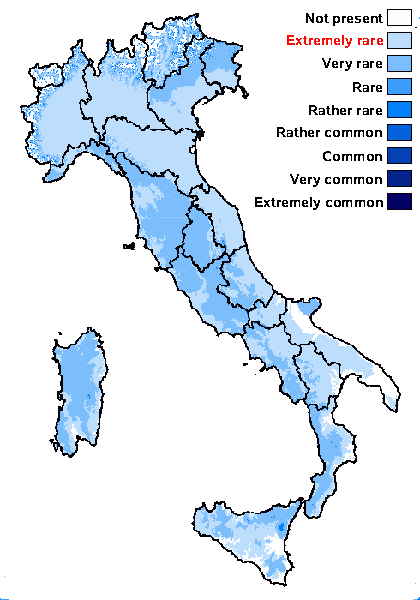
Predictive model
Herbarium samples
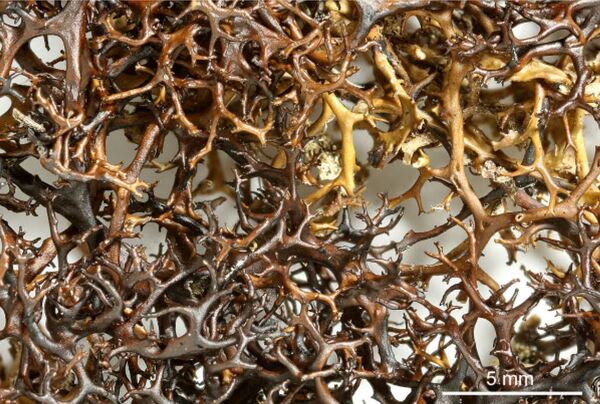

Felix Schumm – CC BY-SA 4.0
[18979], Australia, Victoria, Basalt Hill, Alpine National Park, Bogong High Plains, 20 km SE of Mt. Beauty, 36°53' S, 147°18 E, 1650 m, on soil and debris in exposed alpine grasslands with basalt outcrops and southerly aspect. Leg. J.A. Elix (40374) & H. Streimann 17.02.1994. LICH. AUSTRALASICI EXS. 278
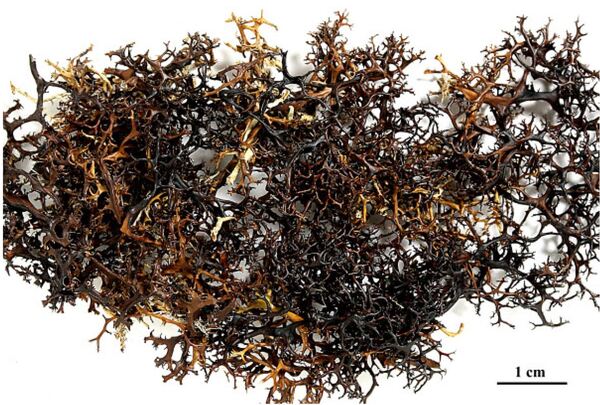

Felix Schumm – CC BY-SA 4.0
[18979], Australia, Victoria, Basalt Hill, Alpine National Park, Bogong High Plains, 20 km SE of Mt. Beauty, 36°53' S, 147°18 E, 1650 m, on soil and debris in exposed alpine grasslands with basalt outcrops and southerly aspect. Leg. J.A. Elix (40374) & H. Streimann 17.02.1994. LICH. AUSTRALASICI EXS. 278
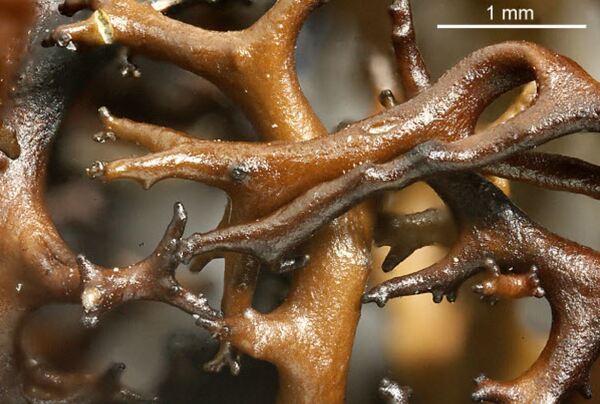

Felix Schumm – CC BY-SA 4.0
[18979], Australia, Victoria, Basalt Hill, Alpine National Park, Bogong High Plains, 20 km SE of Mt. Beauty, 36°53' S, 147°18 E, 1650 m, on soil and debris in exposed alpine grasslands with basalt outcrops and southerly aspect. Leg. J.A. Elix (40374) & H. Streimann 17.02.1994. LICH. AUSTRALASICI EXS. 278
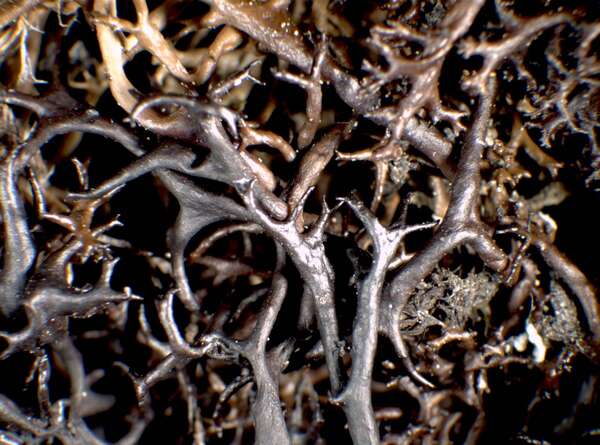

P.L. Nimis; Owner: Department of Life Sciences, University of Trieste
Herbarium: TSB (21023)
2001/12/07
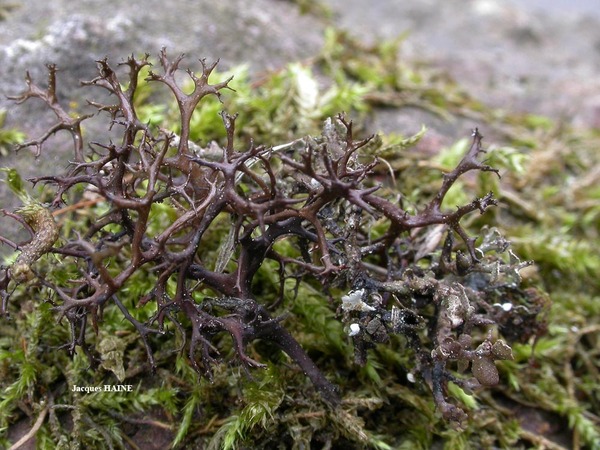
Jacques Haine - Source: http://www.lichensmaritimes.org/index.php?task=fiche&lichen=199&lang=en
France, Laon
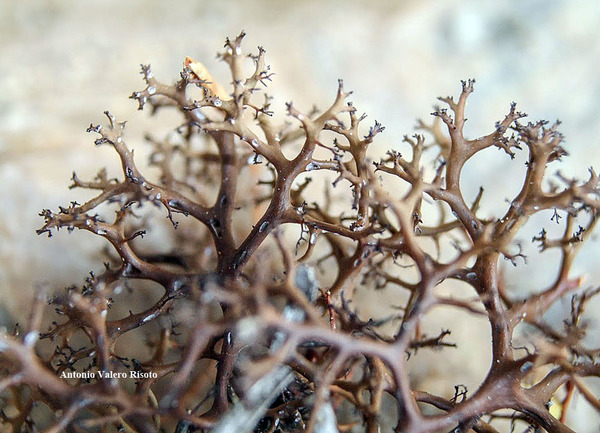
Antonio Valerio Risoto - Source: http://www.lichensmaritimes.org/index.php?task=fiche&lichen=199&lang=en
Spain, Avila
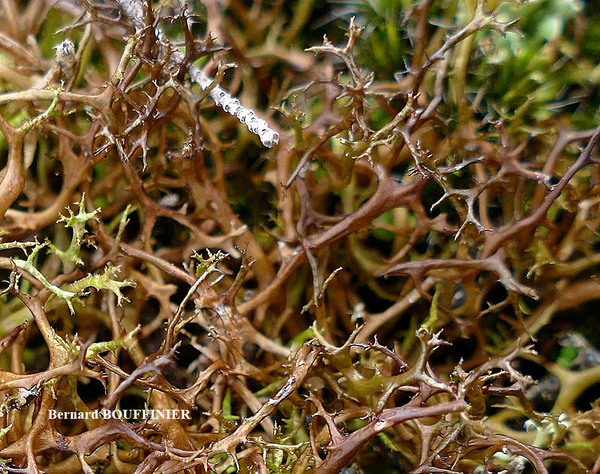
Bernard Bouffinier - Source: http://www.lichensmaritimes.org/index.php?task=fiche&lichen=199&lang=en
France, Quelern
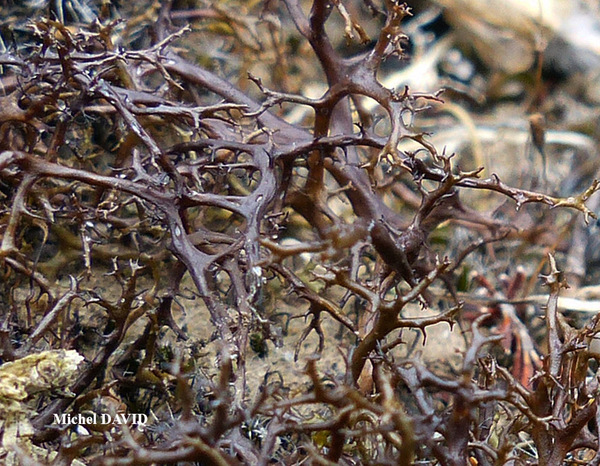
Michel David - Source: http://www.lichensmaritimes.org/index.php?task=fiche&lichen=199&lang=en
France, Camaret
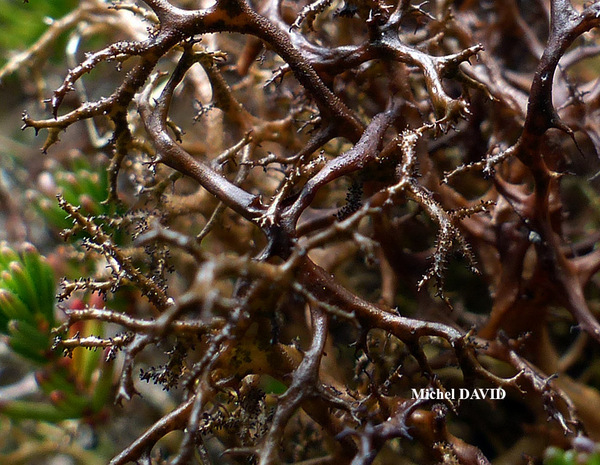
Michel David - Source: http://www.lichensmaritimes.org/index.php?task=fiche&lichen=199&lang=en
France, Camaret
Growth form: Fruticose
Substrata: soil, terricolous mosses, and plant debris
Photobiont: green algae other than Trentepohlia
Reproductive strategy: mainly sexual
Commonnes-rarity: (info)
Alpine belt: absent
Subalpine belt: rather rare
Oromediterranean belt: rather rare
Montane belt: very rare
Submediterranean belt: extremely rare
Padanian area: extremely rare
Humid submediterranean belt: very rare
Humid mediterranean belt: extremely rare
Dry mediterranean belt: absent

Predictive model
| Herbarium samples |


Felix Schumm – CC BY-SA 4.0
[18979], Australia, Victoria, Basalt Hill, Alpine National Park, Bogong High Plains, 20 km SE of Mt. Beauty, 36°53' S, 147°18 E, 1650 m, on soil and debris in exposed alpine grasslands with basalt outcrops and southerly aspect. Leg. J.A. Elix (40374) & H. Streimann 17.02.1994. LICH. AUSTRALASICI EXS. 278


Felix Schumm – CC BY-SA 4.0
[18979], Australia, Victoria, Basalt Hill, Alpine National Park, Bogong High Plains, 20 km SE of Mt. Beauty, 36°53' S, 147°18 E, 1650 m, on soil and debris in exposed alpine grasslands with basalt outcrops and southerly aspect. Leg. J.A. Elix (40374) & H. Streimann 17.02.1994. LICH. AUSTRALASICI EXS. 278


Felix Schumm – CC BY-SA 4.0
[18979], Australia, Victoria, Basalt Hill, Alpine National Park, Bogong High Plains, 20 km SE of Mt. Beauty, 36°53' S, 147°18 E, 1650 m, on soil and debris in exposed alpine grasslands with basalt outcrops and southerly aspect. Leg. J.A. Elix (40374) & H. Streimann 17.02.1994. LICH. AUSTRALASICI EXS. 278


P.L. Nimis; Owner: Department of Life Sciences, University of Trieste
Herbarium: TSB (21023)
2001/12/07

Jacques Haine - Source: http://www.lichensmaritimes.org/index.php?task=fiche&lichen=199&lang=en
France, Laon

Antonio Valerio Risoto - Source: http://www.lichensmaritimes.org/index.php?task=fiche&lichen=199&lang=en
Spain, Avila

Bernard Bouffinier - Source: http://www.lichensmaritimes.org/index.php?task=fiche&lichen=199&lang=en
France, Quelern

Michel David - Source: http://www.lichensmaritimes.org/index.php?task=fiche&lichen=199&lang=en
France, Camaret

 INDEX FUNGORUM
INDEX FUNGORUM
 GBIF
GBIF
 DOLICHENS
DOLICHENS
